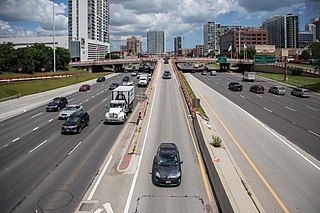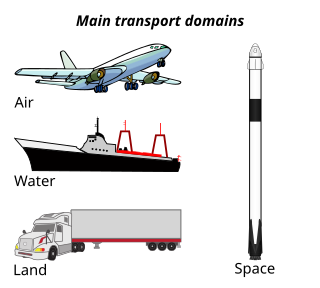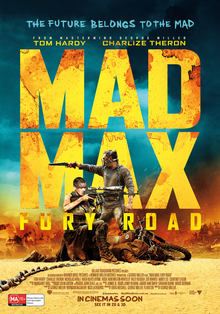
A road is a thoroughfare for the conveyance of traffic that mostly has an improved surface for use by vehicles and pedestrians. Unlike streets, whose primary function is to serve as public spaces, the main function of roads is transportation.

Roman roads were physical infrastructure vital to the maintenance and development of the Roman state, built from about 300 BC through the expansion and consolidation of the Roman Republic and the Roman Empire. They provided efficient means for the overland movement of armies, officials, civilians, inland carriage of official communications, and trade goods. Roman roads were of several kinds, ranging from small local roads to broad, long-distance highways built to connect cities, major towns and military bases. These major roads were often stone-paved and metaled, cambered for drainage, and were flanked by footpaths, bridleways and drainage ditches. They were laid along accurately surveyed courses, and some were cut through hills or conducted over rivers and ravines on bridgework. Sections could be supported over marshy ground on rafted or piled foundations.

The Dwight D. Eisenhower National System of Interstate and Defense Highways, commonly known as the Interstate Highway System, or the Eisenhower Interstate System, is a network of controlled-access highways that forms part of the National Highway System in the United States. The system extends throughout the contiguous United States and has routes in Hawaii, Alaska, and Puerto Rico.

A highway is any public or private road or other public way on land. It includes not just major roads, but also other public roads and rights of way. In the United States, it is also used as an equivalent term to controlled-access highway, or a translation for motorway, Autobahn, autostrada, autoroute, etc.

The Silk Road was a network of Eurasian trade routes active from the second century BCE until the mid-15th century. Spanning over 6,400 km (4,000 mi), it played a central role in facilitating economic, cultural, political, and religious interactions between the Eastern and Western worlds. The name "Silk Road" was first coined in the late 19th century, but some 20th- and 21st-century historians instead prefer the term Silk Routes, on the grounds that it more accurately describes the intricate web of land and sea routes connecting Central, East, South, Southeast, and West Asia as well as East Africa and Southern Europe.

U.S. Route 66 or U.S. Highway 66 was one of the original highways in the United States Numbered Highway System. It was established on November 11, 1926, with road signs erected the following year. The highway, which became one of the most famous roads in the United States, ran from Chicago, Illinois, through Missouri, Kansas, Oklahoma, Texas, New Mexico, and Arizona before terminating in Santa Monica in Los Angeles County, California, covering a total of 2,448 miles (3,940 km).

Wile E. Coyote and the Road Runner are a duo of cartoon characters from the Looney Tunes and Merrie Melodies series of animated cartoons, first appearing in 1949 in the theatrical short Fast and Furry-ous. In each episode, the cunning, devious and constantly hungry coyote repeatedly attempts to catch and eat the roadrunner, but is humorously unsuccessful. Instead of using animal instinct, the coyote deploys absurdly complex contraptions to try to catch his prey. They comically backfire, with the coyote often getting injured in slapstick fashion. Many of the items for these contrivances are mail-ordered from a variety of companies implied to be part of the Acme Corporation. TV Guide included Wile E. Coyote in its 2013 list of "The 60 Nastiest Villains of All Time".

Abbey Road Studios is a music recording studio at 3 Abbey Road, St John's Wood, City of Westminster, London. It was established in November 1931 by the Gramophone Company, a predecessor of British music company EMI, which owned it until Universal Music Group (UMG) took control of part of it in 2013. It is ultimately owned by UMG subsidiary Virgin Records Limited.

Left-hand traffic (LHT) and right-hand traffic (RHT) are the practices, in bidirectional traffic, of keeping to the left side and to the right side of the road, respectively. They are fundamental to traffic flow, and are sometimes called the rule of the road. The terms right- and left-hand drive refer to the position of the driver and the steering wheel in the vehicle and are, in automobiles, the reverse of the terms right- and left-hand traffic. The rule also includes where on the road a vehicle is to be driven, if there is room for more than one vehicle in the one direction, and the side on which the vehicle in the rear overtakes the one in the front. For example, a driver in an LHT country would typically overtake on the right of the vehicle being overtaken.

The Grand Trunk Road is one of Asia's oldest and longest major roads. For at least 2,500 years it has linked Central Asia to the Indian subcontinent. It runs roughly 3,655 km (2,271 mi) from Teknaf, Bangladesh on the border with Myanmar west to Kabul, Afghanistan, passing through Chittagong and Dhaka in Bangladesh, Kolkata, Kanpur, Agra, Aligarh, Delhi, Amritsar in India, and Lahore, Rawalpindi, and Peshawar in Pakistan.

Abbey Road is the eleventh studio album by the English rock band the Beatles, released on 26 September 1969, by Apple Records. It is the last album the group recorded, although Let It Be (1970) was the last album completed before the band's break-up in April 1970. It was mostly recorded in April, July, and August 1969, and topped the record charts in both the United States and the United Kingdom. A double A-side single from the album, "Something" / "Come Together", was released in October, which also topped the charts in the US.

"Take Me Home, Country Roads", also known simply as "Country Roads", is a song written by Bill Danoff, Taffy Nivert and John Denver. It was released as a single performed by Denver on April 12, 1971, peaking at number two on Billboard's US Hot 100 singles for the week ending August 28, 1971. The song was a success on its initial release and was certified Gold by the RIAA on August 18, 1971, and Platinum on April 10, 2017. The song became one of John Denver's most popular songs. It has continued to sell, with over 1.8 million digital copies sold in the United States.

A controlled-access highway is a type of highway that has been designed for high-speed vehicular traffic, with all traffic flow—ingress and egress—regulated. Common English terms are freeway, motorway, and expressway. Other similar terms include throughway or thruway and parkway. Some of these may be limited-access highways, although this term can also refer to a class of highways with somewhat less isolation from other traffic.

Waterloo Road is a British television drama series set in a comprehensive school of the same name, first broadcast on BBC One on 9 March 2006, concluding its original run on 9 March 2015, exactly nine years after the broadcast of the first episode.
The UCI Road World Championships are the annual world championships for bicycle road racing organized by the Union Cycliste Internationale (UCI). The UCI Road World Championships consist of events for road race and individual time trial, and as of 2019, a mixed team relay.

Transport or transportation is the intentional movement of humans, animals, and goods from one location to another. Modes of transport include air, land, water, cable, pipelines, and space. The field can be divided into infrastructure, vehicles, and operations. Transport enables human trade, which is essential for the development of civilizations.

A traffic collision, also known as a motor vehicle collision, or car crash, occurs when a vehicle collides with another vehicle, pedestrian, animal, road debris, or other moving or stationary obstruction, such as a tree, pole or building. Traffic collisions often result in injury, disability, death, and property damage as well as financial costs to both society and the individuals involved. Road transport is statistically the most dangerous situation people deal with on a daily basis, but casualty figures from such incidents attract less media attention than other, less frequent types of tragedy. The commonly used term car accident is increasingly falling out of favor with many government departments and organizations, with the Associated Press style guide recommending caution before using the term. Some collisions are intentional vehicle-ramming attacks, staged crashes, vehicular homicide or vehicular suicide.

Mad Max is an Australian media franchise created by George Miller and Byron Kennedy. It centers on a series of post-apocalyptic and dystopian action films. The franchise began in 1979 with Mad Max, and was followed by three sequels: Mad Max 2, Mad Max Beyond Thunderdome (1985) and Mad Max: Fury Road (2015); Miller directed or co-directed all four films. A spin-off, Furiosa: A Mad Max Saga, was released in 2024 and was also directed by Miller. Mel Gibson originally portrayed the series' title character, Max Rockatansky, in the first three films, while Tom Hardy and Jacob Tomuri portrayed the character in the later two films.

Mad Max: Fury Road is a 2015 Australian post-apocalyptic action film co-written, co-produced, and directed by George Miller. Miller collaborated with Brendan McCarthy and Nico Lathouris on the screenplay. The fourth instalment in the Mad Max franchise, it was produced by Village Roadshow Pictures, RatPac-Dune Entertainment and Kennedy Miller Mitchell, and distributed by Roadshow Entertainment in Australia and by Warner Bros. Pictures internationally. The film stars Tom Hardy and Charlize Theron, with Nicholas Hoult, Hugh Keays-Byrne, Rosie Huntington-Whiteley, Riley Keough, Zoë Kravitz, Abbey Lee, and Courtney Eaton in supporting roles. Set in a post-apocalyptic desert wasteland where petrol and water are scarce commodities, Fury Road follows Max Rockatansky (Hardy), who joins forces with Imperator Furiosa (Theron) against warlord Immortan Joe (Keays-Byrne) and his army, leading to a lengthy road battle.

The Belt and Road Initiative, known in China as the One Belt One Road and sometimes referred to as the New Silk Road, is a global infrastructure development strategy adopted by the Chinese government in 2013 to invest in more than 150 countries and international organizations. The BRI is composed of six urban development land corridors linked by road, rail, energy, and digital infrastructure and the Maritime Silk Road linked by the development of ports.



















